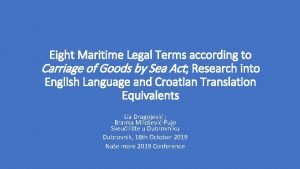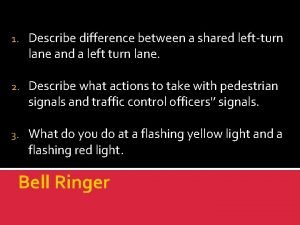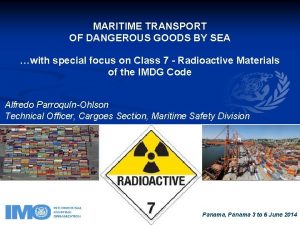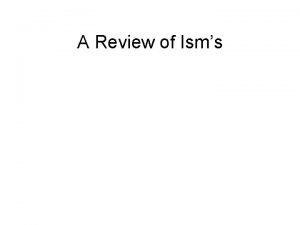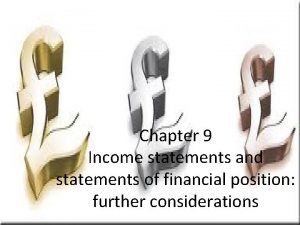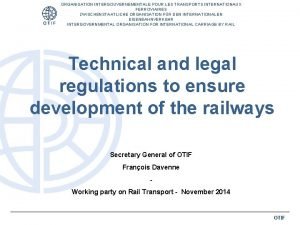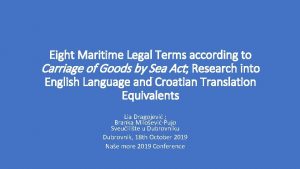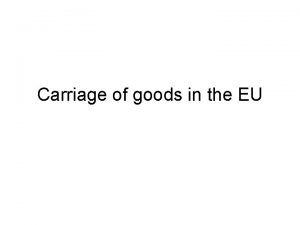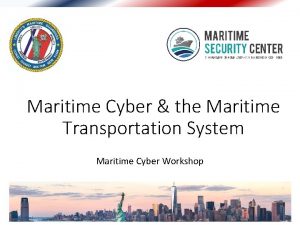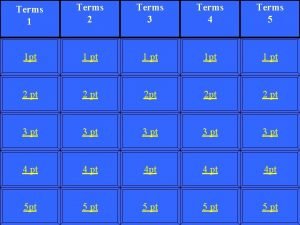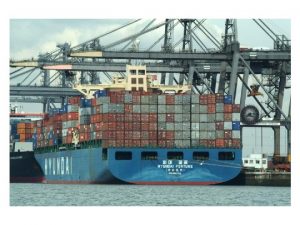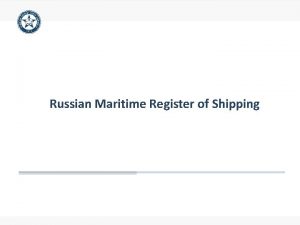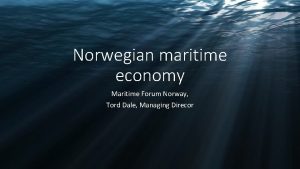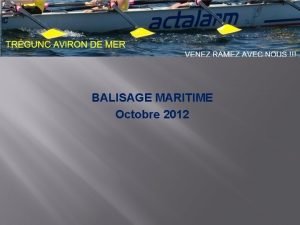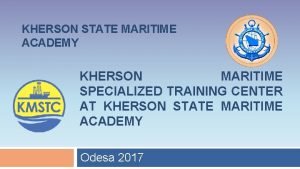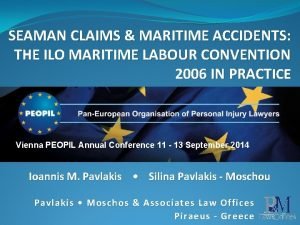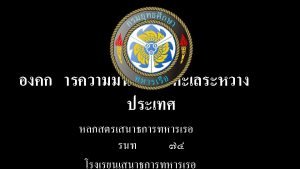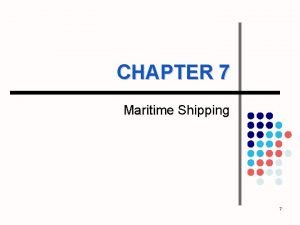Eight Maritime Legal Terms according to Carriage of

























- Slides: 25

Eight Maritime Legal Terms according to Carriage of Goods by Sea Act; Research into English Language and Croatian Translation Equivalents Lia Dragojević ; Branka Milošević-Pujo Sveučilište u Dubrovnik, 18 th October 2019 Naše more 2019 Conference

Summary • Seafaring and Maritime Law worldwide require a high level of linguistic competences in Maritime English since the majority of the documents nowadays are written in English. Croatian seafarers are global citizens whose careers will be realized aboard mainly foreign companies worldwide. Therefore, we chose twenty full-time thirdyear students of the Nautical Department of the University of Dubrovnik (enrolled in the academic year 2018/19) who were involved in the linguistic research. The survey was compiled by their two lecturers (one in Maritime Law, the other in Maritime English). The research took place from April 8 th to 15 th, 2019. The aim of the study was, to continue investigations into Maritime English i. e. specialized Maritime Law terminology. The level of the students' knowledge has usually been very satisfactory so far, due to the number of hours of English language during their previous and current education. Our aim was to collect the data and systemize them. Therefore, 8 (eight) following terms have been taken into consideration in the research: Time Charter, Voyage Charter, Carrier, Shipper, Bill of Lading, Sea Waybill, Laytime and Demurrage. By the end of the research, the results will have shown detailed definitions, translational equivalents and semantic features of the terms. Our students have shown an exceptional motivation and a great effort, necessary for their future profession. On the other hand, their lecturers have collected the data and results which will be used in improving our teaching materials for oncoming generations. Keywords: Maritime Law, Maritime English, Nautical Department, linguistic research • •

Notion of Maritime Property Law Maritime property law is a system of legal norms regulating property relations in the activities at sea. Property relations refer to the relations among persons, who cooperate in a common maritime adventure. The legal basis of those relations is the contract, but the relations might occur also beyond the contract, based on the law. Maritime Property Law includes Carriage of Goods by Sea Act and other acts.

Dubrovnik Statute 1272 Dubrovnik played an important role in the development of codification. The law of the Republic of Dubrovnik, regarding maritime insurance, is considered to be the oldest law of that type in the world. The Conventions regulating the carriage of goods by sea will be listed chronologically. The first Convention of this type was signed in Brussels in 1924. It is known as Bill of Lading Conventions i. e. Hague Rules. The goal of the Convention was to limit the freedom of contracting, to protect the transport user. The convention refers only to the contracts for which Bills of Lading have been issued. The Maritime Code of The Republic of Croatia is applied to all the contracts regardless Bill of Lading.

Hague Rules In 1967. The Protocol of the revision of the Hague Rules was enacted, known as Hague-Visby Rules. Further development of commerce and seafaring led to the further necessity to revise the provisions of maritime law, especially law regarding seaborne transport, so under the guidance of the United Nations, the procedure of the revision of the existing rules started. The aim was to diminish the role of the carrier, with the users of the transport services. Thus, the famous Hamburg Rules appeared. The significance of these Rules is the fact that they considerably and severely increase shipper's responsibility. Croatia has not ratified this Convention although some provisions were incorporated into the Maritime Code of the Republic of Croatia. Although the unification had been the final goal, it did not happen because some countries remained obliged by the Hague Rules and other accepted the Hague-Visby Rules, and some of them ratified the Hamburg Rules. Therefore we have concluded that the unification has not been achieved.

Hague-Visby Rules Although the unification had been the final goal, it did not happen because some countries remained obliged by the Hague Rules and other accepted the Hague-Visby Rules, and some of them ratified the Hamburg Rules. Therefore we have concluded that the unification has not been achieved. Due to all the above mentioned, a new revision regarding carriage of goods by sea was done and consequently, in Rotterdam on the 23 rd September, 2009 the Convention known as the Rotterdam Rules was signed. These Rules introduce essential news, making the Carrier considerably more responsible. They introduce electronic papers, extend the obligation of “due diligence" and incorporate the principle of “door to door". Mentioned Rules will be enforced once they have been ratified by more than twenty States.

Maritime English The English language has long been the lingua franca of seafaring because the multilingual environment had required one working language. That is not the language of common people, but a specialized language for specific purposes (ESP). According to Cole and Trenker (2004) there are 341 million people, who use English as a first language and around 300 million use it as a second language. They state that in 105 countries, around 50% of the world total, it has official or special status.

Boris Pritchard (2011) • Boris Pritchard defined in 2011 maritime legal texts as specific type of legal instruments and documents with binding force in national legislation and international maritime law. Those texts could be: international conventions, treaties, regulations, rules, contracts and official documents. • Not many authors discussed the qualities and features of Maritime English (ME) from the linguistic point of view. However, in 2014, in Canada, Daniele Franceschi published in the International Journal of English Linguistics the article titled The Features of Maritime English Discourse. The paper refers to the previous studies in ME by the following authors: Maurizio Gotti (2005), Peter Trenker (2000), N. Demydenko (2012), Boris Pritchard (1999, 2003, 2011), et al.

Franceschi, Daniele (2014) Franceshi focused on maritime law written text based on the analysis of the corpus of one issue of the Journal of International Maritime Law. The author states that Maritime English in the domain of maritime law is the most specialized one, which has been proven by the existence of glossaries and dictionaries in this specific field. He gives an example of the word arrest which refers to the act of taking a person into custody, but in maritime law, it specifically indicates seizing and holding a ship under lawful authority. At the same time, the expression lay days meaning allowed period for loading/unloading the cargo without the payment and this expression does not exist at all, in common everyday speech. He also states that maritime law domain applies a formal style, which is evident by Latin-based words (e. g. salvage). Lexical redundancy is also particularly common as in the following sentence in which the word mortgage is repeated four times.

Franceschi, Daniele (2014) • Lexical redundancy often results in doublets (e. g. terms and conditions), whose purpose is to reinforce and emphasize a certain concept. Finally, antiquated vocabulary is normal in maritime law terminology (e. g. herein, therein, witnesseth, etc. ) An authoritative tone of maritime law texts has usually been achieved by the adoption of full Latin phrases (e. g. res derelicatae = abandoned marine property) and by the use of fixed expressions (e. g. as the content may require, unless otherwise defined, etc. ) Maritime law texts tend to be heavy and they also contain a lot of passive forms and expressions involving the use of impersonal you which contribute considerably to neutrality, formality, and clarity. The author concludes that this special language or rather languages should be viewed as a multi-faceted type of specialized discourse and that the reader of Maritime English texts is required to have a multidisciplinary and integrated knowledge of the maritime field.

Tominac-Coslovich, Sandra and Borucinsky, Mirjana (2015) • Sandra Tominac-Coslovich and Mirjana Borucinsky in 2015 discussed the grammatical level of maritime law institutional texts saying that in those types of texts one could find a limited usage of tenses, reduced negations of the sentences (e. g. unnecessary, inefficient, none) and special usage of modal auxiliaries (e. g. shall, for expressing obligation). • Tominac-Coslovich Sandra & Borucinsky, Mirjana (2015) Sintaktički diskontinuitet u izvornom pomorskom pravnom tekstu na engleskom jeziku i u njegovu prijevodu na hrvatski. U Od Šuleka do Schengena: Terminološki, terminografski i prijevodni aspekti jezika struke Urednici: Maja Bratanić, Ivana Brač i Boris Pritchard; Zagreb: Institut za hrvatski jezikoslovlje. pp. 283 -300.

Maritime Croatian In the development of the Croatian maritime terminology, an important role was played by the maritime schools on our coast: the first one in Perast, mentioned as early as in the 16 th century, then the Nautical School of Kotor, which was opened in the 19 th century, and the Nautical School of Bakar and Dubrovnik (1852)

Croatian Vocabularies • The Croatian nation could proudly say that it had its vocabulary of the Croatian language as early as in the 16 th century. It was compiled by Faust Vrančić (1551 -1617) from Šibenik. Then, there was another one by Matija Alberti ( 1561 - 1623) from Split. One century later, Pavao Ritter Vitezović (1652 -1713) compiled the vocabulary which is still in manuscript. It was thoroughly studied by Blaž Jurišić. It contained 2, 253 maritime-related terms. It was specific for distinguishing general from a specific maritime vocabulary. Ardelio Della Bella (1655 -1737) also published a specific vocabulary. In the 18 th century, Joakim Stulli, a Jesuit of Dubrovnik, published Croatian-Italian-Latin Vocabulary in three versions. This vocabulary is considered to be the synthesis of the linguistic heritage of the literature of Dubrovnik and the mirror of the way of life in the Republic of Dubrovnik. During the 19 th century, Blaž Jurišić (1891 -1974) published the dictionary by Jakov Antun Mikoč, which had been in a manuscript. Božo Babić also based his studies on this vocabulary.

Croatian Maritime Terminology Mato Vodopić (1816 -1893), who was the bishop of Dubrovnik and writer of a famous short-story titled Tužna Jele (1866), adopted original Croatian maritime vocabulary (about 80 words clarified in footnotes) with recommendations to continue the research into Croatian lexicology. Božo Babić (1840 -1912) contributed considerably to the development of Croatian terminology. He was the officer aboard an Austro-Hungarian vessel, and on his voyage from Klek to Trpanj, according to his diary, he decided to collect Croatian words and eliminate foreign expressions. He succeeded in his intention. He published 6 booklets of maritime-related terminology, by which he fought against Italian phrases, wanting to eliminate them. He is considered to be the founder of the Croatian maritime related terminology.

„Naše more” Journal • After World War I, when „Our Sea“ started to be published, a fierce discussion regarding the Croatian maritime terminology began between Juraj Carić and Rudolf Crnić in our journal. On one hand, Carić advocated the view that Italian phrases should be used and criticized the work of the Bakar School, which wanted to eliminate Italian phrases. He formed his opinion according to Pero Budmani (1835 -1914) philologist from Dubrovnik and editor of the Vocabulary of Jugoslav Academy of Science and Arts. Crnić wanted even to penalize the usage of foreign terminology, but the real spoken language of Merchant Marine officers remained unchanged.

Data • Maritime Department of the University of Dubrovnik has Maritime English as an obligatory course, in the semesters 1 -5 according to the Syllabus adopted by the Senate of the University of Dubrovnik in the year 2014. within the number of hours per week: 1 st semester: 2 lectures and 2 exercises 2 nd semester: 2 lectures and 2 exercises; 3 rd semester: 2 lectures and 2 exercises; 4 th semester 2 lectures and 2 exercises; and 5 th semester 1 lecture and 2 exercises. On the other hand, the course in Maritime Law as a subject is present in the first year as 4 lectures per week during the 1 st semester and Maritime Property Law lectures are structured 3 lectures per week - 6 th semester.

Survey paper No. 1 • The Survey paper No 1. contained eight (8) maritime law terms in English: Time Charter; Voyage Charter; Carrier; Shipper; Bill of Lading; Sea Waybill; Laytime and Demurrage. Students were asked to give translational equivalents in Croatian. The selection of the terms was done according to Pavić (2006, pp. 100 -120). We limited our choice only to those terms which were also found in William Tetley's Glossary of Maritime Law Terms.

Survey papers No 2 and No 3 The Survey paper No. 2. contained a questionnaire, which required from the students to put on the paper an exact letter of definition from the Survey paper number No. 3. The students showed great interest and enthusiasm in solving the quiz, which they were offered. The third survey paper contained the definitions of eight terms out of William Tetley's Glossary. The definitions of those terms were limited to one to three sentences. The selection of the terms was randomly done and we are conscious that the choice is not comprehensive and representative. This has been just an attempt to test our students and to raise their (and our) level of consciousness regarding maritime property law terminology.

Eight terms • 1. Time Charter - Brodarski ugovor na vrijeme • 2. Voyage Charter - Brodarski ugovor za putovanje • 3. Carrier - Prijevoznik • 4. Shipper - Krcatelj • 5. Bill of Lading - Teretnica • 6. Sea Waybill - Pomorski teretni list • 7. Laytime - Vrijeme stojnica • 8. Demurrage - Prekostojnice

Results Survey paper No. 1 Instead of Brodarski govor na vrijeme, students used the following terms: Brodski ugovor na vrijeme, Ugovor na vrijeme, Brod se daje u zakup na vrijeme, Brodski najam na vrijeme. Two the students provided exact answers as mentioned above. Instead of Brodarski ugovor za putovanje students offered the following terms: Ugovor na putovanje, Brodski najam na putovanje, Ugovor o putovanju, Brod se daje u zakup na putovanje, Brodski ugovor na jedno ili više uzastopnih putovanja Instead of Prijevoznik students used: Prijevozitelj, Prevozitelj, Osoba koja prevozi teret. The term Shipper is translated as following: Brodar, Nositelj pomorskog podhvata or Krcatelj. The term Bill of Lading was translated as Teretnica in all cases. The term Sea Waybill was translated as (Pomorski) teretni list. The term Laytime was translated as Stojnica or Stojnice. Finally, the term Demurrage was translated either as Vozarina or Ležarina

Results Survey paper No 2 and 3 The comprehension of maritime property law-related terms (Survey paper No. 2. ) was very successful (joining definitions to the terms), and students showed the high level of knowledge of the provided terminology (Survey paper No. 3. ). About 70 % of the answers were correct. This has been ascribed to their intrinsic motivation in the subject matter as well as to the previous number of hours, both in Maritime Law and Maritime English. International maritime law has always been a very attractive subject worldwide for seafarers, economists, and jurists.

Conclusion The goal of the research was to determine the level of knowledge in maritime legal terminology. The authors prepared the Survey containing three papers in which there were provided eight (8) maritime property legal institutional terms. The target group were the students of the third year – summer term of the Nautical Department. There were 18 full-time and 15 part-time students. The survey was carried out among 11 students. The results have shown that out of 11 candidates, one student achieved excellent score, six of them very good, two of them good and one failed. In the remaining two survey papers, which required checking comprehension of the terminology, the examinees were more successful, having achieved 70% correctness. The results of the survey have proven to the professors in Maritime Law and Maritime English that our students are competent and knowledgable in those scientific areas. We will use them as guidelines for teaching future generations of students.

Sažetak Osam pomorskopravnih termina iz Ugovora o prijevozu stvari morem na engleskom i hrvatskom jeziku Sažetak Pomorstvo i pomorsko pravo zahtijevaju visoku razinu lingvističkih kompetencija iz pomorskoga engleskog jezika, budući da je većina dokumenata danas napisana na engleskome. Pomorci, državljani Republike Hrvatske svjetski su građani, čije će se karijere ostvariti na brojnim stranim kompanijama širom svijeta. Stoga smo odabrale dvadeset (20) redovitih studenata treće godine sudija Nautike Sveučilišta u Dubrovniku, upisanih u akademskoj godini 2018/19 koje smo uključile u lingvističko istraživanje. Anketu su sastavile predmetne nastavnice (jedna iz pomorskoga prava, a druga iz pomorskoga engleskog). Istraživanje se odvijalo od 8. do 11. travnja 2019. Cilj proučavanja je bio nastaviti istraživanja iz područja pomorskoga engleskoga t. j. posebnu pomorskopravnu terminologiju. Razina znanja studenata je bila zadovoljavajuća, zbog broja sati na kolegiju Pomorski engleski jezik za vrijeme njihovoga prethodnog obrazovanja, ali smo željele sakupiti podatke i sistematizirati ih. Poradi toga, osam (8) sljedećih termina smo uzele u obzir u istraživanju: Voyage Charter, Carrier, Time Charter, Bill of Lading, Sea Waybill, Shipper, Laytime i Demurrage. Do kraja istraživanja, rezultati će pokazati detaljne definicije, prijevodne ekvivalente i semantičke značajke termina. Naši studenti pokazuju izuzetnu motivaciju i veliki napor potreban za svoju buduću profesiju. S druge strane, njihove predmetne nastavnice prikupile su podatke i rezultate koje će koristiti u poboljšanju nastavnih materijala za nadolazeće generacije. Ključne riječi: pomorsko pravo; pomorski engleski; Nautički Odjel; lingvističko istraživanje


 Sea eight maritime services
Sea eight maritime services A short section of corrugated roadway that warns of hazards
A short section of corrugated roadway that warns of hazards Plane shape
Plane shape Legal responsibility in healthcare
Legal responsibility in healthcare Nursing legal terms
Nursing legal terms Like terms and unlike terms in polynomials
Like terms and unlike terms in polynomials Combining like terms practice
Combining like terms practice Objectives of income statement
Objectives of income statement Class 7 dangerous goods
Class 7 dangerous goods Houses at estaque
Houses at estaque Difference between conservancy and water carriage system
Difference between conservancy and water carriage system On his blindness rhyme scheme
On his blindness rhyme scheme Water carriage system
Water carriage system Income statement carriage inwards
Income statement carriage inwards Carriage inwards is expenses or income
Carriage inwards is expenses or income Carriage outwards
Carriage outwards Carriage trade shop definition
Carriage trade shop definition Shape of sewer
Shape of sewer Conservancy system and water carriage system
Conservancy system and water carriage system Classification of sewage system
Classification of sewage system Lesson plan of from a railway carriage
Lesson plan of from a railway carriage Common carriage
Common carriage In drilling machine the chuck is mounted on mcq
In drilling machine the chuck is mounted on mcq A ball rolling down an incline has its minimum speed
A ball rolling down an incline has its minimum speed Carriage grinding machine
Carriage grinding machine Strategiearten
Strategiearten
